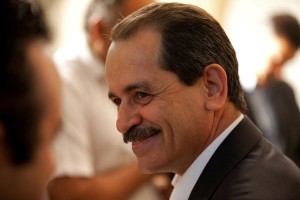
Source: International Campaign for Human Rights in Iran
July 17th, 2015
Imprisoned Founder of Spiritual Group Awaits Clarification on His Sentence
Uncertainty surrounds the sentence of Mohammad Ali Taheri, the imprisoned founder of a spiritual healing and cultural group. The Judiciary spokesman says he has been sentenced but his lawyer says this is “incorrect.”
“I went to the court on Tuesday July 14 and no sentence has been issued. If a sentence is issued, they will first inform me and my client. I’m sure [Judiciary Spokesman Gholamhossein Mohseni] Ejei has been given the wrong information,” Taheri’s lawyer, Mahmoud Alizadeh Tabatabaee, told the International Campaign for Human Rights in Iran.
Ejei had stated in a press conference on July 13 that Taheri had been sentenced at the initial stage and that he could request an appeal. Yet Ejei did not reveal what the sentence was.
Mohammad Ali Taheri, founder of the “Erfan-e Halgheh” spiritual arts and healing group, is facing the charge of “Corruption on Earth” which carries the possibility of the death penalty. On June 20, 2015, his lawyer had expressed concern that the judge had issued the death penalty but the next day this was denied by the Judiciary.
Taheri established the Erfan-e Halgheh institute in Tehran during the 2000s, and, using healing concepts, treated patients with psychological and medical conditions. He was arrested in 2010 by the Islamic Revolutionary Guards on charges of “acting against national security” and was held in solitary confinement for 67 days before he was released.
On May 4, 2011, he was arrested again and on October 30, 2011, Branch 26 of the Tehran Revolutionary Court sentenced him to five years in prison for “blasphemy,” to 74 lashes for “touching the wrists of female patients,” and 900 million toman in fines (approximately $300,000) for “interfering in medical science,” “earning illegitimate funds,” and “distribution of audio-visual products and use of academic titles.”
The authorities in Iran do not formally acknowledge Taheri’s group, Erfan-e Halgheh, but in addition to imprisoning Taheri and prosecuting him on a charge that potentially carries the death penalty, its institute has been closed down.
The authorities take a harsh view of any individual who promotes alternative spiritual beliefs in Iran. They are seen as national security threats, especially if they attract Shia Muslims. As such, the authorities also severely prosecute Baha’is who propagate their faith, Gonabadi Dervishes, and evangelical Christians who seek converts to Christianity, demonstrating the continued systematic denial of freedom of religion in the Islamic Republic.




